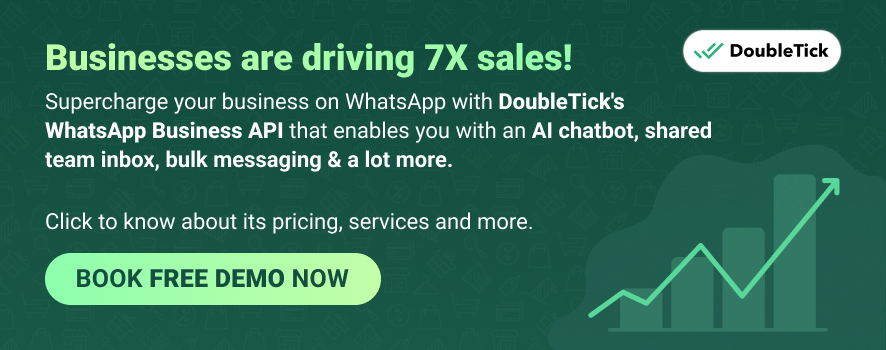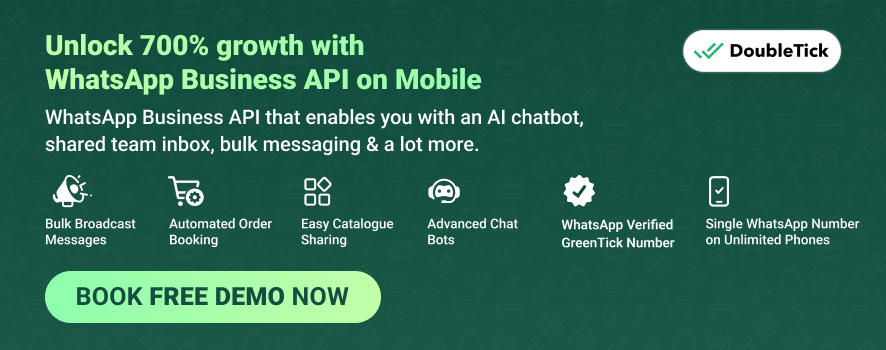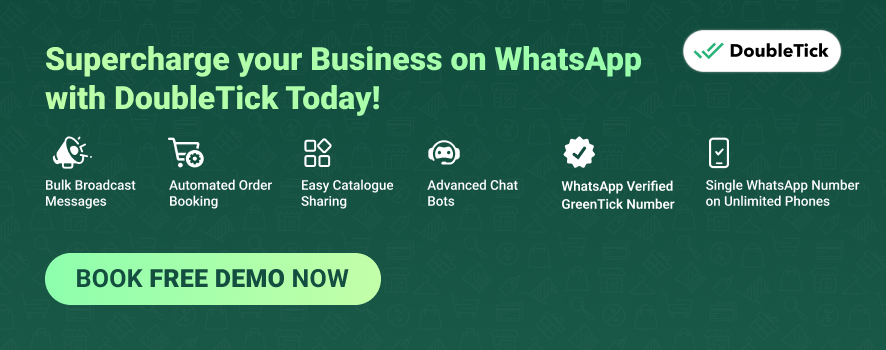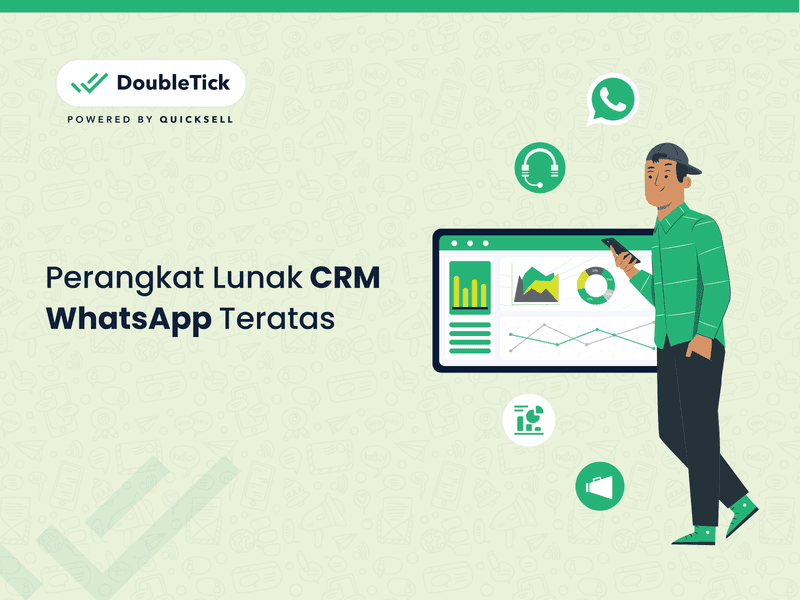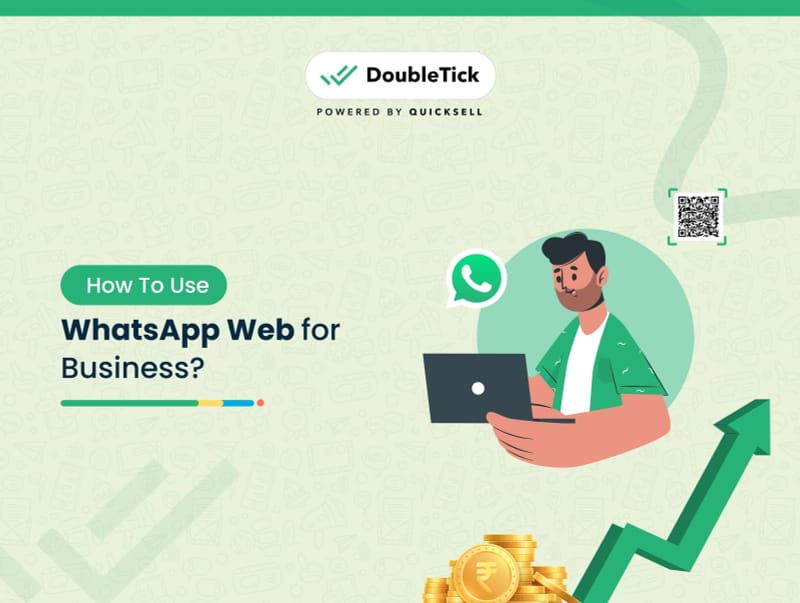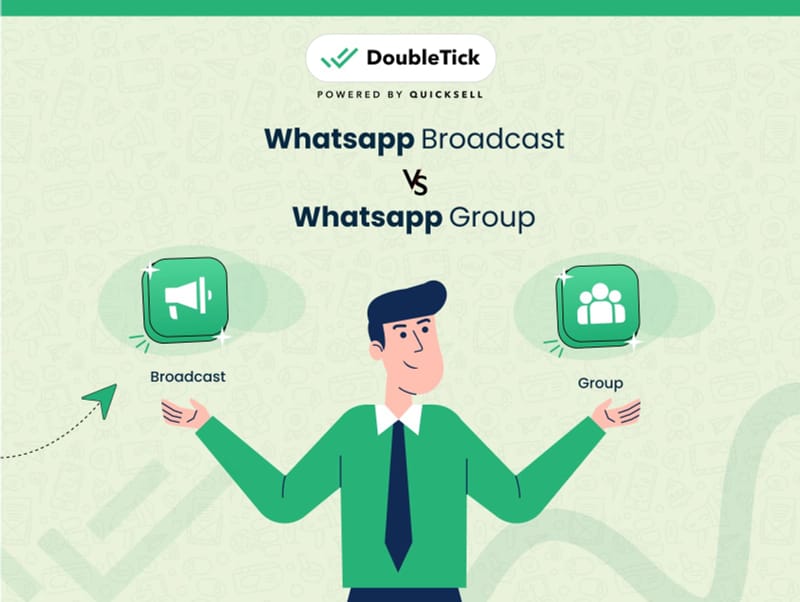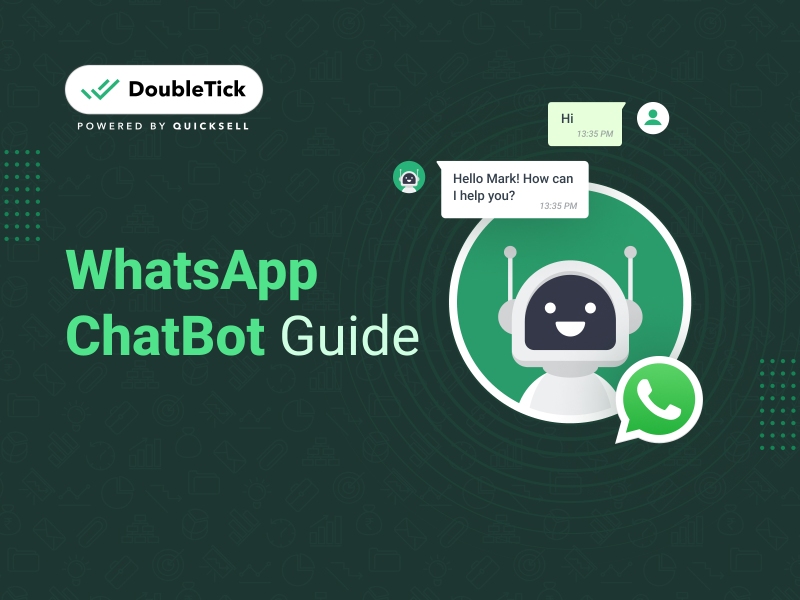
Contents
- Understanding Chatbots for WhatsApp
- The Benefits of Using Chatbots on WhatsApp
- Key Features of WhatsApp ChatBots
- WhatsApp Chatbot Use Cases
- Top Industries Leveraging WhatsApp Chatbots
- Tips for Implementing a WhatsApp Chatbot
- How to Get WhatsApp Chatbot?
- Why DoubleTick?
- How to Get DoubleTick?
- How to Create a ChatBOT Using DoubleTick?
- The Future of Chatbots on WhatsApp
- Frequently Asked Question
In recent years, chatbots have emerged as powerful tools that businesses across various industries are embracing to streamline communication and enhance customer service. As the world moves towards instant gratification, consumers expect real-time responses and personalized experiences. The integration of chatbots on platforms like WhatsApp enables businesses to engage with customers more effectively, automate routine tasks and provide an opportunity to tap into the vast user base of the popular messaging app.
As we delve into this comprehensive guide, we will explore the world of WhatsApp chatbot, how it works, and understand its features, benefits, and applications across different industries. We'll also look at how to create (get) a WhatsApp chatbot & integrate it with WhatsApp Business API. Our purpose is to offer an exclusive, one-stop resource for businesses looking to leverage the power of chatbots on WhatsApp to automate business communication and customer support efforts 24x7!
Understanding Chatbots for WhatsApp
A chatbot is an AI-driven software designed to simulate human conversation through text or voice-based interactions. These digital assistants are programmed to understand and respond to user queries effectively, providing valuable information, recommendations, and support.
WhatsApp, with over 2.24+ billion users globally, has become a preferred platform for chatbot integration, allowing businesses to extend their reach and improve customer engagement. WhatsApp chatbots not only provide instant responses to customer queries but also help businesses automate routine tasks, enhance efficiency, and gain valuable insights from customer data.
The Benefits of Using Chatbots on WhatsApp
WhatsApp chatbots come with a host of benefits that can significantly impact a business's growth and customer satisfaction. Some of the most noteworthy advantages include:
- Improved customer service: WhatsApp chatbots can handle multiple customer inquiries simultaneously, providing instant and personalized responses. This not only improves the overall customer experience but also ensures that customer concerns are addressed quickly and efficiently.
- Increased efficiency: By automating routine tasks, such as answering FAQs, processing transactions, or handling appointment scheduling, chatbots free up valuable time for employees, allowing them to focus on more strategic tasks that contribute to business growth.
- Cost savings: Implementing chatbots on WhatsApp can lead to significant cost savings as businesses can reduce their reliance on staff for handling customer queries. This not only saves on staffing costs but also optimizes processes, resources and business response time.
- Automate business operation: Chatbots can streamline various business processes, such as order management, invoicing, inventory tracking, and reporting, resulting in improved efficiency and better decision-making.
- Enhanced customer data array and analysis: Chatbots can collect and analyze vast amounts of customer data, allowing businesses to gain valuable insights into customer behaviour, preferences, and trends. This can help draft marketing strategies, product development, and overall business direction.
Looking for free WhatsApp Promotional Message Templates?
Click Here to access the 50+ Best WhatsApp Promotional Message Templates That Work Like a Charm!
Key Features of WhatsApp ChatBots
WhatsApp chatbots come with an array of features that make them powerful tools for businesses. Some of the most important features include:
- WhatsApp Business API: To leverage the power of WhatsApp chatbots you should first have an access to the WhatsApp Business API, as official integration of chatbots on WhatsApp is made possible through the WhatsApp Business API platform like DoubleTick. Any unofficial or other third-party modes of WhatsApp chatbots integration are illegal and your account can be permanently banned if noticed by WhatsApp.
- End-to-end encryption: Security is a paramount concern for businesses and customers alike. WhatsApp chatbots come with end-to-end encryption, ensuring that all communication between businesses and customers remains private and secure.
- Natural language processing (NLP): NLP technology enables chatbots to understand and interpret human language, making them capable of providing more relevant and contextual responses to user queries. This greatly enhances the user experience and increases the effectiveness of chatbots.
- Multi-language support: In a diverse market like India, multi-language support is crucial for businesses looking to cater to customers across different regions. WhatsApp chatbots can be programmed to support multiple languages, ensuring that businesses can engage with a wider range of customer demographics effectively and deliver a personalized experience.
- Integration with other platforms: WhatsApp chatbots can be integrated with various business platforms, such as CRM systems, inventory management tools, and marketing automation software. This facilitates seamless data exchange and improves overall efficiency, enabling businesses to make data-driven decisions.
- Advanced analytics: Chatbots on WhatsApp come with built-in analytics that allows businesses to monitor performance, customer interactions, and engagement levels. These insights can be invaluable in optimizing the chatbot's performance and making necessary improvements to enhance customer experience.
Confused about WhatsApp's conversation-based pricing model?
Read this article to clear up your doubts! Click Here
WhatsApp Chatbot Use Cases
WhatsApp Chatbots have transformed the way businesses communicate with their customers. With the integration of AI and NLP, they have opened up new possibilities for businesses to provide efficient and personalized customer experiences. Here are some of the most popular use cases for WhatsApp Chatbots:
- Customer Support: Chatbots provide instant support to customers, answering their queries and resolving issues. They can handle multiple inquiries simultaneously, reducing wait times and improving customer satisfaction.
- Order Tracking: Chatbots can send automated updates about the status of orders, from processing to delivery, ensuring customers are informed at every stage of the process.
- Product Recommendations: By analyzing customer preferences and browsing history, chatbots can provide personalized product recommendations, driving sales and customer engagement.
- Appointment Scheduling: Chatbots can help customers book appointments or make reservations, streamlining the process for both the customer and the business.
- Feedback Collection: Chatbots can gather customer feedback and reviews, providing valuable insights for businesses to improve their products and services.
- Lead Generation: Chatbots can capture lead information and nurture potential customers through the sales funnel, ultimately increasing conversions.
- Payment Reminders: Chatbots can send automated payment reminders to customers, helping businesses reduce late payments and maintain healthy cash flow.
- Promotions and Discounts: Chatbots can share special offers, discounts, and promotions with customers, driving sales and boosting customer loyalty.
- Surveys and Polls: Chatbots can conduct surveys and polls, collecting valuable data to help businesses make informed decisions and improve their offerings.
- Onboarding and Training: Chatbots can guide new employees through the onboarding process and provide ongoing training and support, ensuring a smooth transition into the company.
- Event Management: Chatbots can assist with event planning, management, and promotion, helping businesses streamline events and engage with attendees more effectively.
- Crisis Management: Chatbots can provide timely updates and information during crises, ensuring customers are well informed and reassured.
These are just a few examples of how WhatsApp Chatbots can be utilized across various industries and business functions. By exploring the potential of chatbots, businesses can leverage the power of AI and NLP to streamline their operations and provide exceptional customer experiences.
Top Industries Leveraging WhatsApp Chatbots
Several industries have recognized the potential of WhatsApp chatbots and are leveraging their capabilities to improve customer service, automate processes, and drive growth. Let's explore some of the top industries that are benefiting from WhatsApp chatbots:
- E-commerce: WhatsApp chatbots have become an integral part of the e-commerce industry, streamlining customer support, order tracking, and providing personalized product recommendations. They can also handle returns and refunds, making the overall shopping experience more convenient for customers. In the wholesale B2B dropshipping space, WhatsApp chatbots can help simplify and automate communication between suppliers and retailers, leading to a more efficient and effective supply chain.
- Healthcare: The healthcare sector is increasingly using WhatsApp chatbots for appointment scheduling, prescription refills, and symptom assessment. Chatbots can also provide general health advice and connect patients with medical professionals, ensuring timely care and support.
- Travel and tourism: WhatsApp chatbots are transforming the way people plan and book their trips. From booking assistance and personalized travel suggestions to itinerary management and providing real-time updates on flights and accommodations, chatbots have become indispensable travel companions.
- Banking and finance: WhatsApp chatbots play a significant role in the banking and finance industry, handling account inquiries, transaction processing, and fraud detection. They can also provide personalized financial advice and help customers manage their investments more effectively.
- Education: Educational institutions are leveraging WhatsApp chatbots for admission inquiries, course information, and providing virtual assistance to students. Chatbots can also be used to send important updates, reminders and notifications, ensuring that students stay informed and engaged.
- Entertainment: In the entertainment industry, WhatsApp chatbots are playing a significant role in enhancing customer engagement and support. They streamline processes like providing personalized content recommendations, offering show timings and booking assistance for movies and events, delivering updates on new releases and promotions, and handling customer inquiries related to subscriptions and account management. By adopting chatbots, entertainment businesses can ensure a seamless and enjoyable experience for their customers.
- Insurance: The insurance sector is leveraging WhatsApp chatbots to enhance customer support, handle policy inquiries, and provide instant quotes. They can also assist with claims processing, guiding customers through the necessary steps and collecting required documentation. Chatbots in this industry help make the insurance process more convenient, efficient, and accessible for customers.
- Wellness and Fitness: WhatsApp chatbots have become an essential tool for wellness and fitness businesses, such as gyms, yoga studios, and health coaching services. They help streamline customer support, manage class schedules and bookings, provide personalized workout and nutrition plans, and send reminders and motivational messages. With the assistance of chatbots, wellness and fitness businesses can cater to their customer's needs more effectively and efficiently, ultimately leading to higher customer satisfaction and retention.
- Real Estate: Real estate businesses are adopting WhatsApp chatbots to manage property inquiries, schedule property viewings, and provide information on available listings. Chatbots can also assist customers with the documentation process and connect them with relevant professionals, such as mortgage brokers and legal advisors. By utilizing chatbots, real estate businesses can offer a more personalized and efficient experience to their customers.
- Food and Beverage: In the food and beverage industry, WhatsApp chatbots are being utilized to manage food orders, provide personalized menu recommendations, and offer information on deals and promotions. They can also handle customer inquiries related to delivery times, allergen information, and dietary preferences. By implementing chatbots, food and beverage businesses can streamline their ordering processes and improve customer satisfaction.
- Logistics and Supply Chain: WhatsApp chatbots are transforming the logistics and supply chain industry by providing real-time updates on shipment tracking, handling order inquiries, and assisting with booking and scheduling deliveries. Chatbots can also facilitate communication between different stakeholders, such as suppliers, carriers, and customers, ensuring a seamless and efficient logistics process.
- Retail: Retail businesses are increasingly using WhatsApp chatbots to improve customer service, provide personalized product recommendations, and manage inventory inquiries. They can also facilitate order placements, process returns, and share updates on promotions and discounts. Integrating chatbots in retail businesses can help enhance customer engagement and drive sales.
These are just a few examples of the numerous industries that are benefiting from the implementation of WhatsApp chatbots. As technology continues to advance and chatbots become more sophisticated, it's likely that even more sectors will adopt these digital assistants to enhance customer experience and optimize their operations.
Now that we have explored the sophistication, key features, use cases, and advantages of chatbots, you might be considering implementing one for your business. Before we delve into the process of acquiring a WhatsApp chatbot, let's first discuss some essential tips and factors to consider, to ensure you make an informed decision that best suits your business needs.
Tips for Implementing a WhatsApp Chatbot
If you're considering implementing a WhatsApp chatbot for your business, here are some essential tips to help you get started:
- Define clear objectives: Before you begin, it's crucial to define the goals you want to achieve with your chatbot. This can include improving customer service, automating specific tasks, or generating leads. Clear objectives will help guide the development process and ensure the chatbot's effectiveness.
- Choose the right chatbot development platform: Select a reliable chatbot development platform like DoubleTick, which offers robust features, seamless integration capabilities, and a proven track record in the industry. With our expertise, you can ensure that your WhatsApp chatbot meets your specific business needs and delivers the desired results.
- Design a user-friendly conversational flow: A well-designed conversational flow is essential for providing a seamless and enjoyable user experience. To optimize the design process, utilize user flow tools and software that allow you to visualize and analyze the conversational flow, ensuring a smooth and intuitive experience for your users.
- Test and iterate: Before launching your WhatsApp chatbot, it's crucial to test its performance and make necessary improvements. This can involve testing different conversational flows, response times, and overall functionality. Regularly iterating the chatbot based on user feedback and analytics will ensure its continued effectiveness.
- Seamless human-agent handover: Although chatbots are highly capable, some situations may require human intervention. Evaluate if your service provider can design your WhatsApp chatbot to identify such scenarios and facilitate a seamless handover to a human agent, ensuring a smooth and uninterrupted customer experience.
- Prioritize security and data privacy: Ensure your chatbot complies with data protection regulations and follows best practices to safeguard user information. Choose a WhatsApp chatbot platform with robust security features and end-to-end encryption, like DoubleTick, to protect sensitive data.
- Offer multi-language support: Check if the chatbot can cater to a diverse audience by providing multi-language support. This will not only enhance customer satisfaction but also help you expand your business reach.
- Plan for scalability: As your business grows, your chatbot should be able to scale accordingly. Choose a chatbot platform that can handle increasing user volumes and additional features without compromising performance. With DoubleTick's WhatsApp chatbot, you can manage an endless number of customer communications without compromising on response time and data security.
- Monitor and analyze performance: Before signing up monitor the performance of the chatbot. This will help you identify areas for improvement and optimize its functionality. Pay close attention to key metrics such as response times, user engagement, and conversion rates to make data-driven decisions and enhance the chatbot's performance.
- Review customer support options: Before choosing a chatbot platform, evaluate the quality of customer support they offer. Timely and effective support is crucial to address any technical issues or concerns that may arise during chatbot implementation and maintenance. At DoubleTick, we're committed to offering 24*7 customer support services via text message, email, calls, or WhatsApp.
- Check for compliance with industry standards and regulations: Ensure that the chatbot platform you choose complies with industry standards and regulations, or other data privacy laws relevant to your business. Compliance with these regulations is crucial to protect your customers' data and avoid potential legal issues.
Considering these pro tips will help you make an informed decision when selecting and implementing a WhatsApp chatbot for your business which will benefit your business and your customers.
Now that we have discussed the essential factors and tips to consider before implementing a WhatsApp chatbot for your business, let's explore the process of acquiring one. In the next section, we will guide you through how you can get and seamlessly integrate a chatbot with your business on WhatsApp.
How to Get WhatsApp Chatbot?
To get a WhatsApp chatbot for your business, you will first need access to the WhatsApp Business API. This is because the official integration of chatbots on WhatsApp is made possible through the official WhatsApp Business API platform like DoubleTick.
Why DoubleTick?
DoubleTick could help you unlock the full potential of WhatsApp for your business. With DoubleTick, you can access the WhatsApp Business API for FREE and create a reliable, smart, AI-based, no-code WhatsApp chatbot tailored to your unique needs. Here are some of the key advantages of signing up with DoubleTick:
- No-Code Chatbots: DoubleTick allows you to create custom WhatsApp chatbots without any programming knowledge. Our team will handle the integration, set up the platform, and train you on using the BOT flow builder, enabling you to create custom WhatsApp BOTS and define flows as your business evolves – all with a simple drag-and-drop interface.
- AI-Powered Commerce BOT: With our AI-Powered Commerce BOT, you can manage end-to-end order booking processes and share product catalogues seamlessly. The Commerce BOT can take and process orders without any human intervention, streamlining your sales process.
- Integration with Business Tools: Integrate the DoubleTick WhatsApp chatbot with your CRM, marketing, or other business tools for a centralized customer communication flow. Our platform ensures smooth integration and data syncing across all your systems.
- 24/7 Customer Support: In case you encounter any issues, our dedicated customer support agents are available 24/7 to assist you and ensure a seamless experience.
- Super Intuitive, Easy to Use, and Mobile-Friendly: DoubleTick's platform is designed to be user-friendly, ensuring a smooth experience even for those with limited technical expertise. The mobile-friendly interface allows you to manage your chatbot and customer interactions on the go, providing flexibility and convenience for your business operations.
Additional Features: DoubleTick offers a range of additional benefits, such as:
- Bulk broadcast your messages and catalogue to unlimited saved and unsaved contacts.
- Automate WhatsApp marketing by scheduling your broadcast messages.
- Single WhatsApp number for your entire company with a cloud-based team inbox and role-based access.
- Automate payments, abandoned carts, order confirmation, and delivery notifications with WhatsApp Automation.
DoubleTick offers a full-fledged WhatsApp Marketing solution built on the official WhatsApp Business API platform. With DoubleTick, you can harness the power of WhatsApp to improve customer engagement, streamline operations, and grow your business effectively.
Read more about DoubleTick here - What is DoubleTick and How This Could Be Your Greatest WhatsApp Marketing and Sales Tool
How to Get DoubleTick?
Kindly email us at grow@quicksell.co or Click Below to get a FREE DEMO to know about our product offering, features and pricing plans.
Now transform WhatsApp into the ultimate sales engine to delight customers and drive revenue with DoubleTick!
Requisites to Apply for DoubleTick WhatsApp Business API
You need:
- A Facebook Business Manager account
- A verified business
- A WhatsApp business account
- A fresh phone number
- A Line of Credit for your WhatsApp business account
- A command line tool such as Terminal or an app like Postman that can perform URL requests (Not needed if applied via DoubleTick)
We'd also need at least two documents from the below list to verify the business:
- Business bank statement
- Business License
- Certificate of incorporation
- Goods and services tax registration certificate (GST)
- Permanent account number card (PAN)
- Shop establishment certificate
- Udyog Aadhar / MSME Certificate
- Utility bill
We can't onboard you if the above documents are not available.
Note:
- You'll have to get a new phone number for your WhatsApp Business API account as you can't use this further for your personal use.
- You can also use your existing phone number for your WhatsApp Business API account but all your data will be erased and you'll not be able to use it for your personal use any further.
How to Create a ChatBOT Using DoubleTick?
Setting up a WhatsApp Chatbot with DoubleTick is remarkably simple. Once you've got the hang of the DoubleTick dashboard, you'll be able to design a personalized chatbot for your business in just 15 minutes.
Follow the steps outlined below to login into the dashboard to create a chatbot:
Step 1: Log in to the DoubleTick web platform. Visit https://web.doubletick.io/login, enter your registered mobile number, and input the OTP you receive via text message on your mobile to access your account.
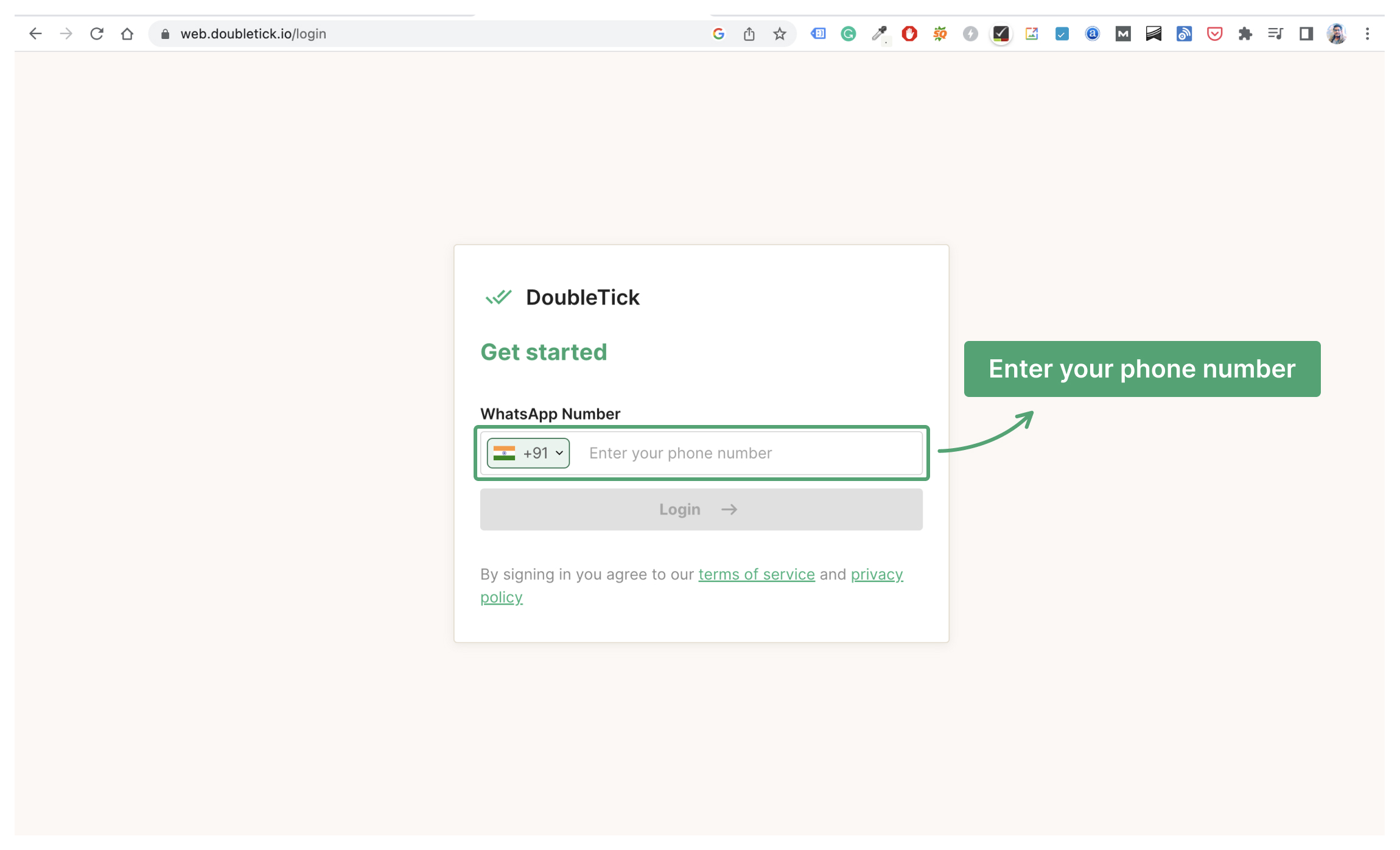
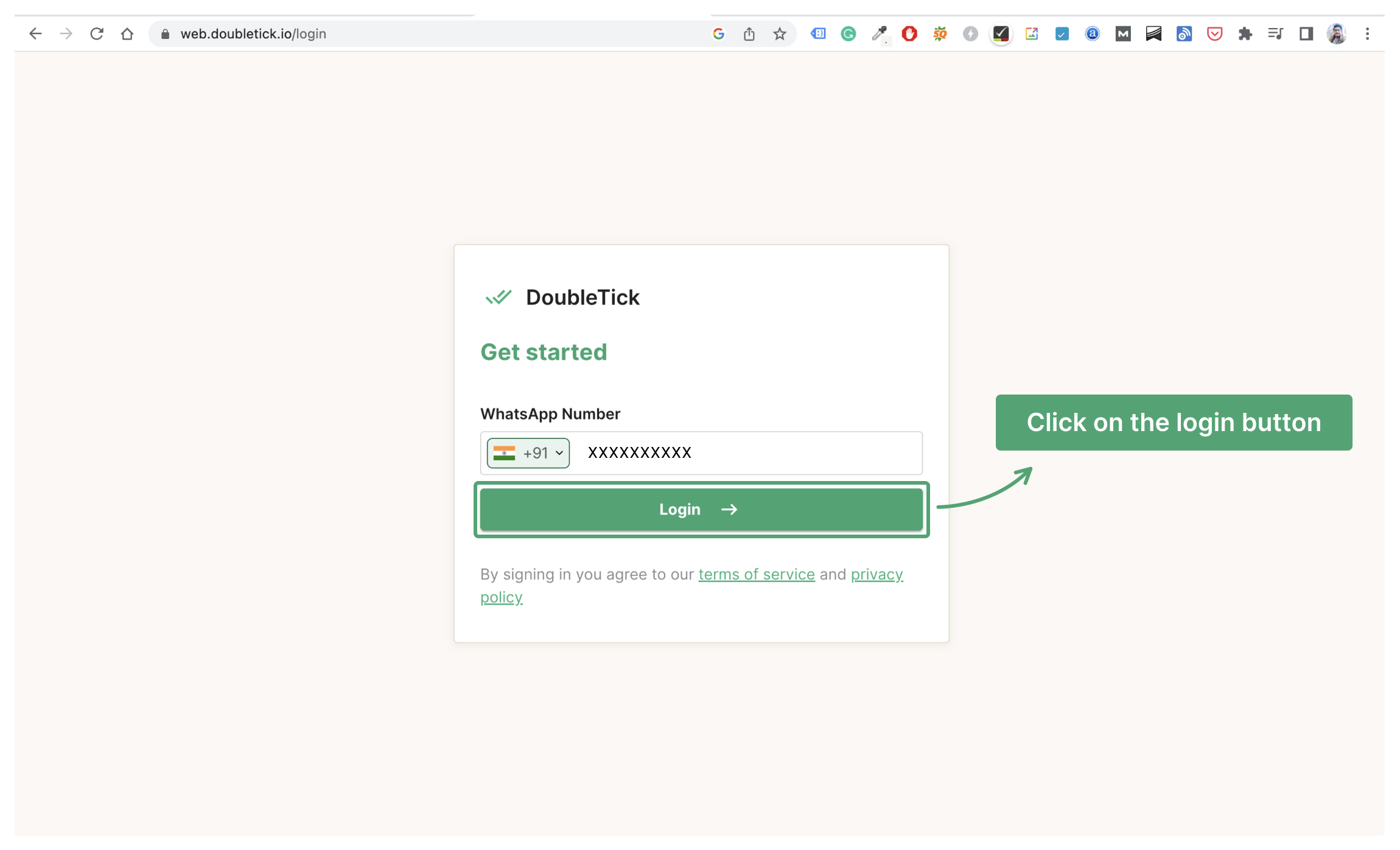
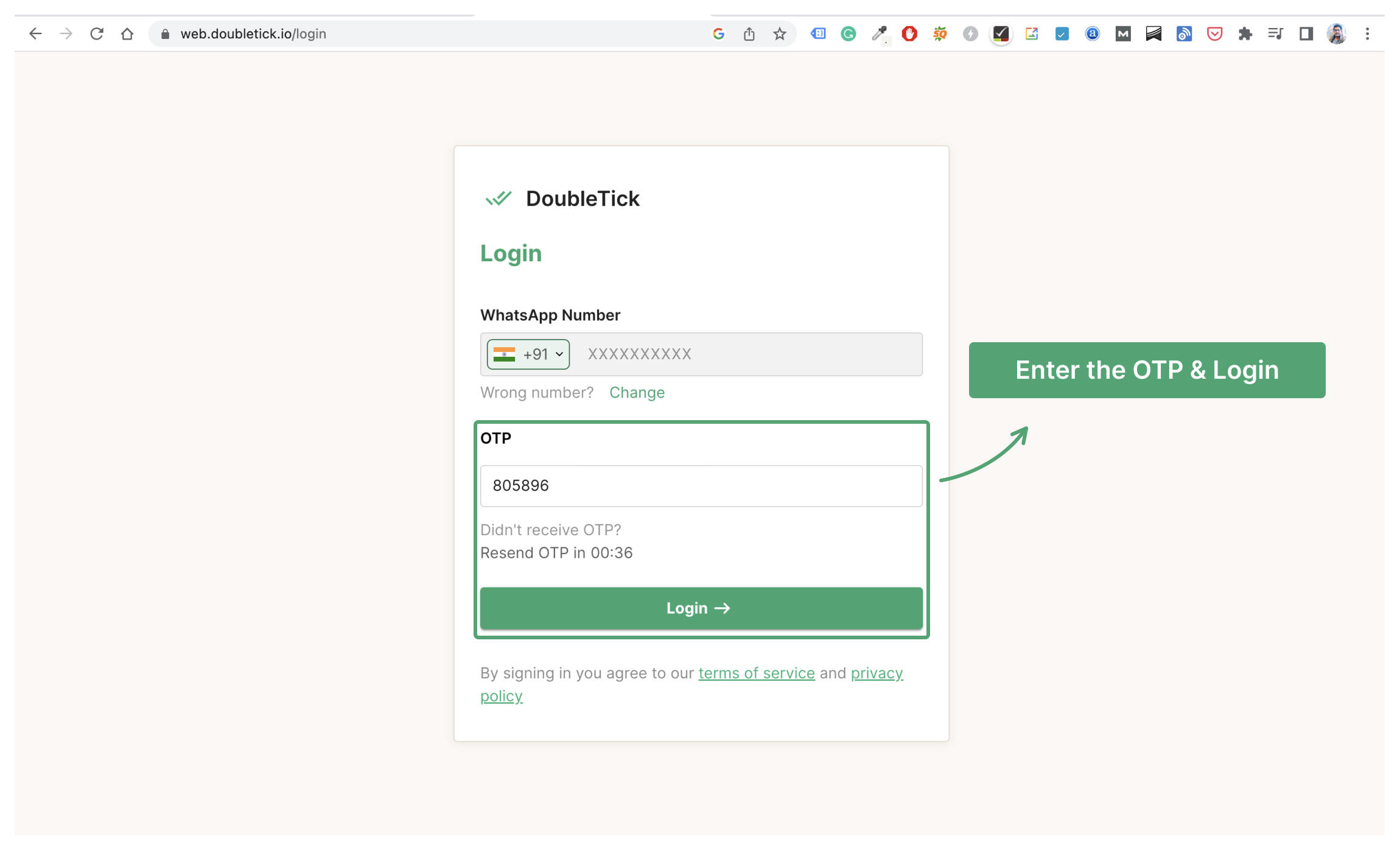
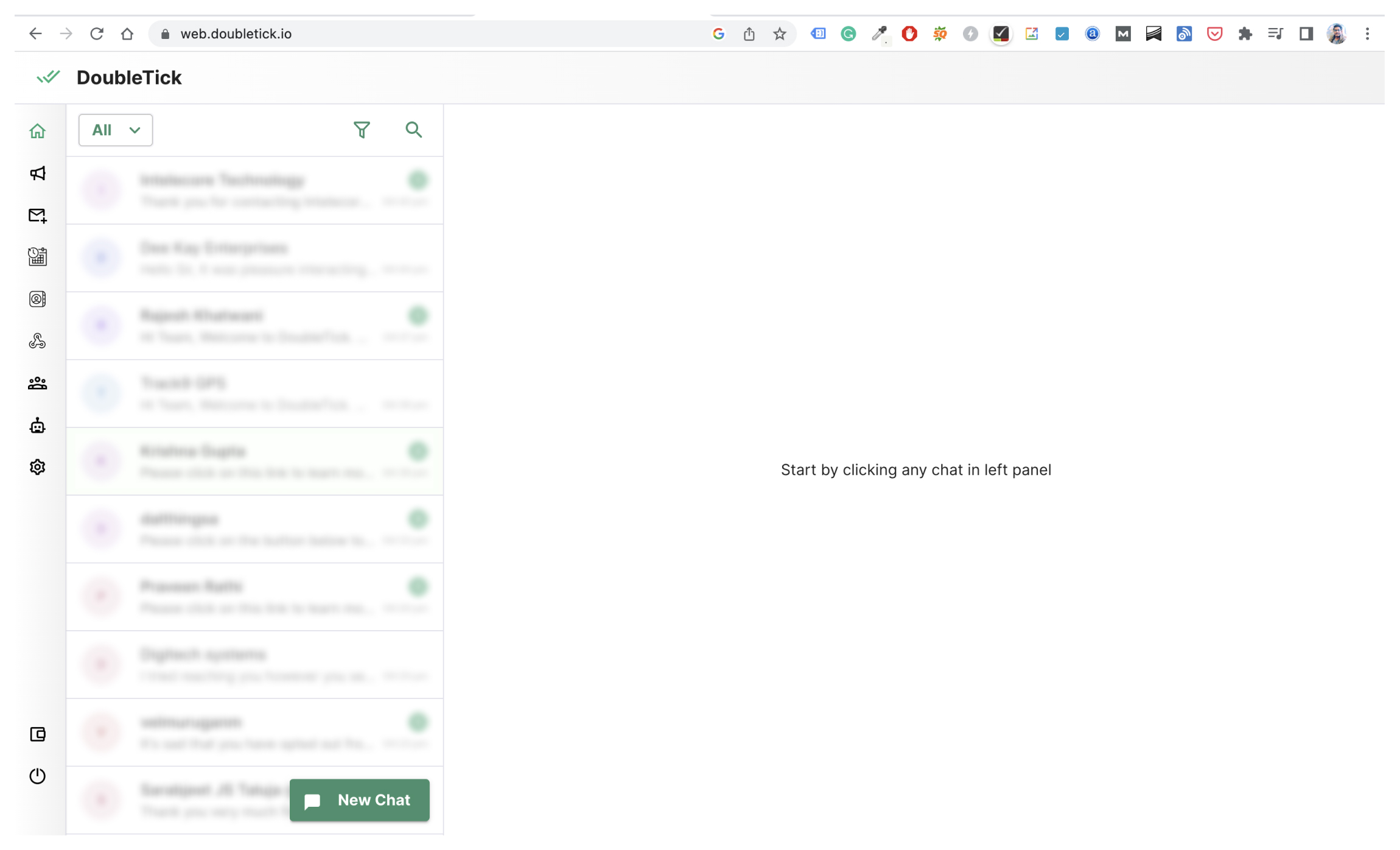
Step 2: Once you're in your account, click on "Bots" located on the left-hand side of the dashboard, and then click on "Create new bot". This action will open up the "Bot Builder" panel. At this point, you can rename your bot as desired.
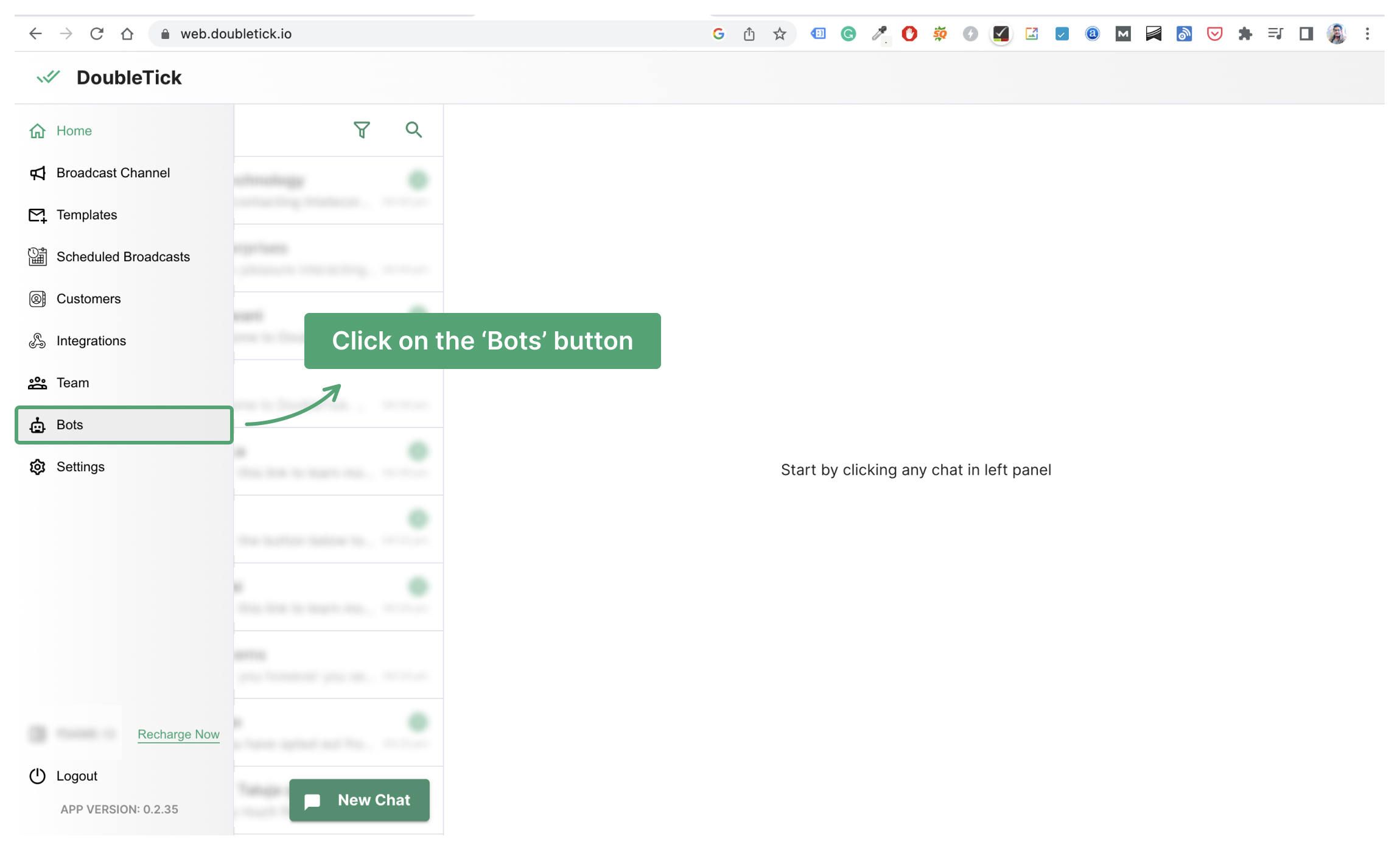
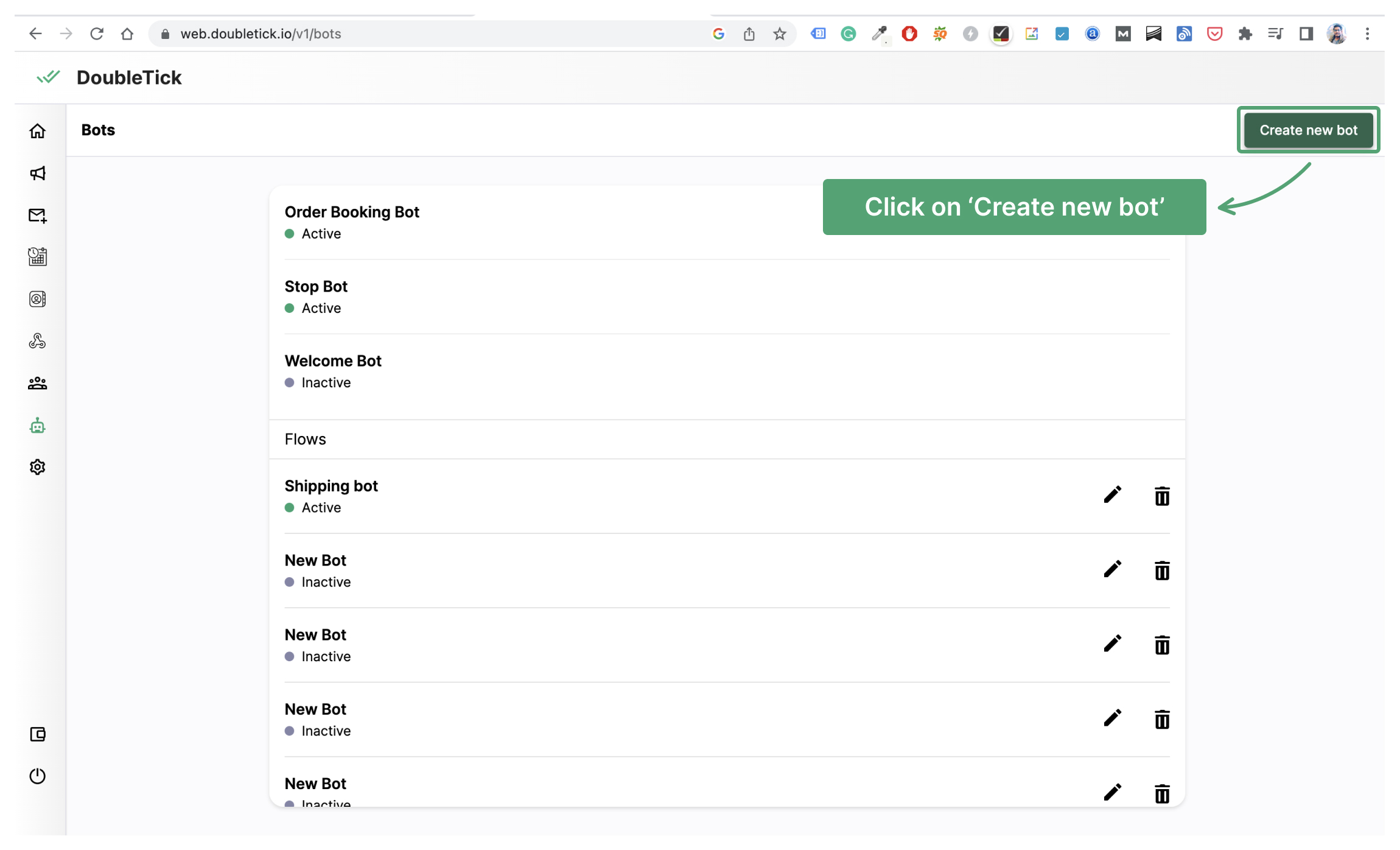
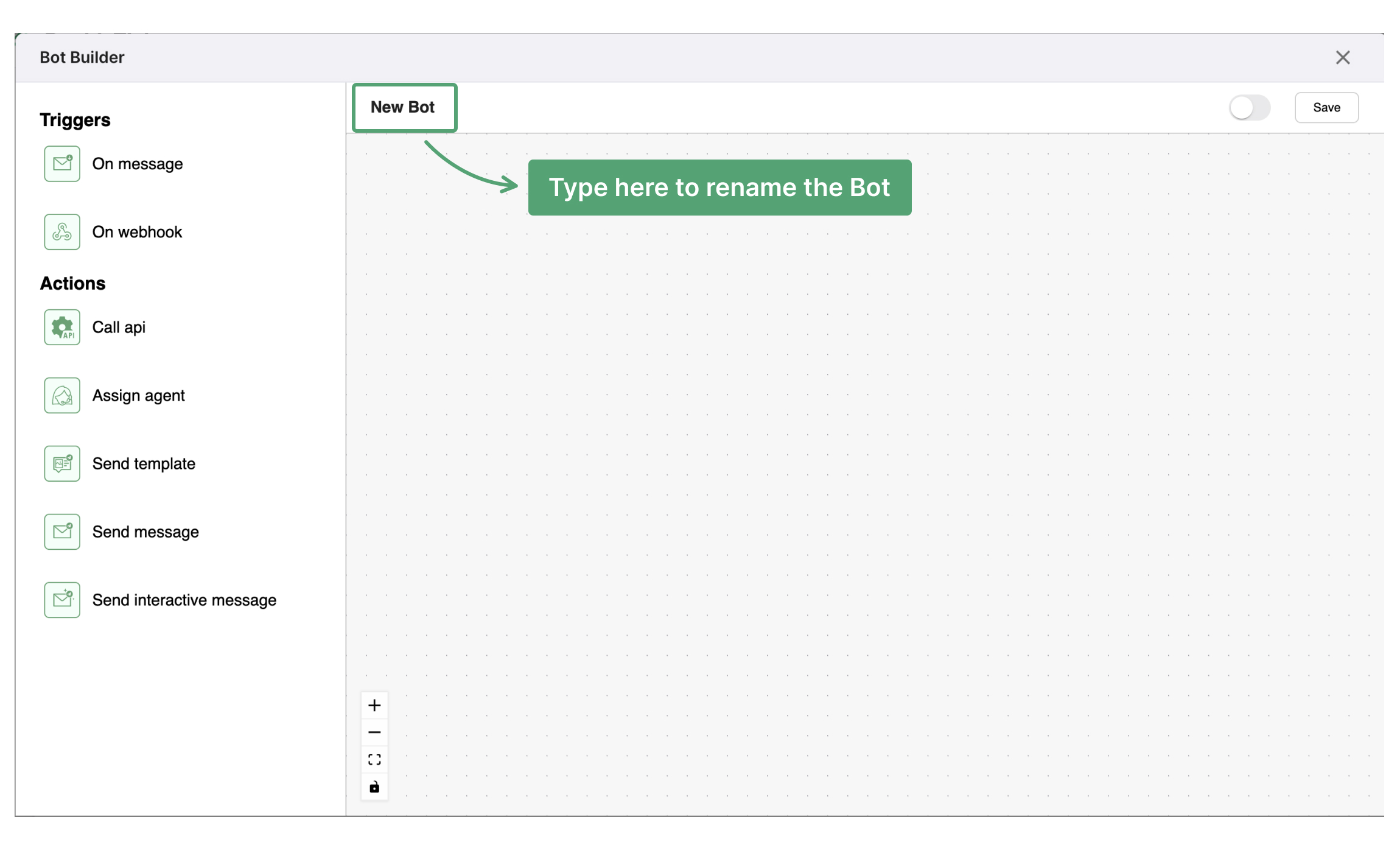
On the dashboard, you could see there are certain buttons under "Triggers" and "Actions".
Under "Triggers" there are 2 buttons:
- On message
- On webhook
Under "Actions" there are 3 buttons:
- Call API
- Assign agent
- Send template
- Send message
- Send interactive message
Now let's understand what are these buttons and how we can play around with them:
Triggers:
On Message button: The On Message button serves as the starting point for the chatbot. When users type keywords associated with this button, it triggers subsequent messages based on the predefined path or flow.
This is how the "On message button" looks like:
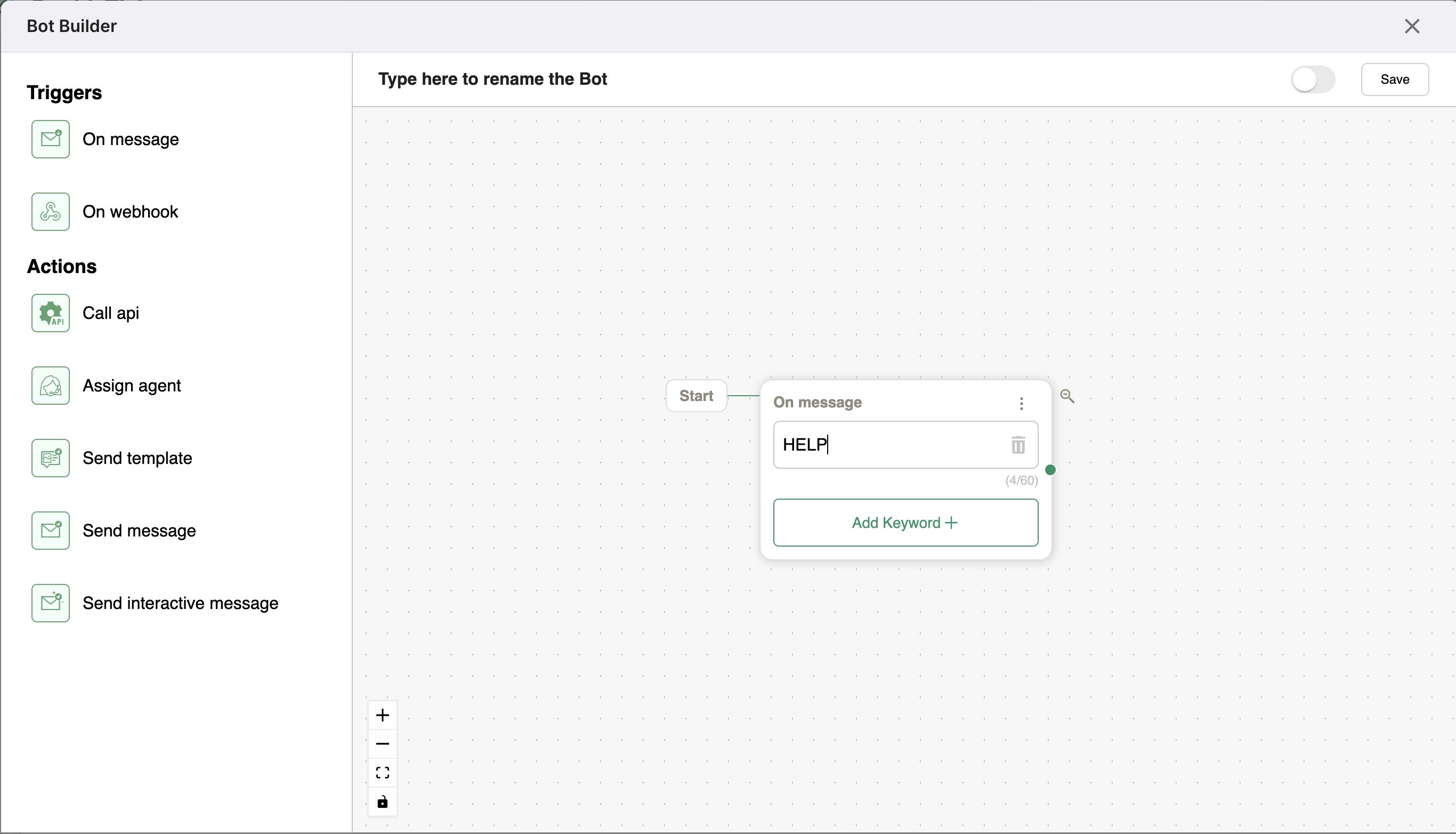
On Webhook button: The On Webhook button allows the chatbot to fetch user action data from third-party tools.
For example, if you're using WooCommerce and want to send automated WhatsApp communications via DoubleTick when customers place orders, you would use this button.
Click on the button, copy the "Webhook URL," and paste it into the root file of the webhook tool. This allows DoubleTick to capture data and trigger responses. Click "Capture Response" when finished.
This is how the "On webhook button" looks like:
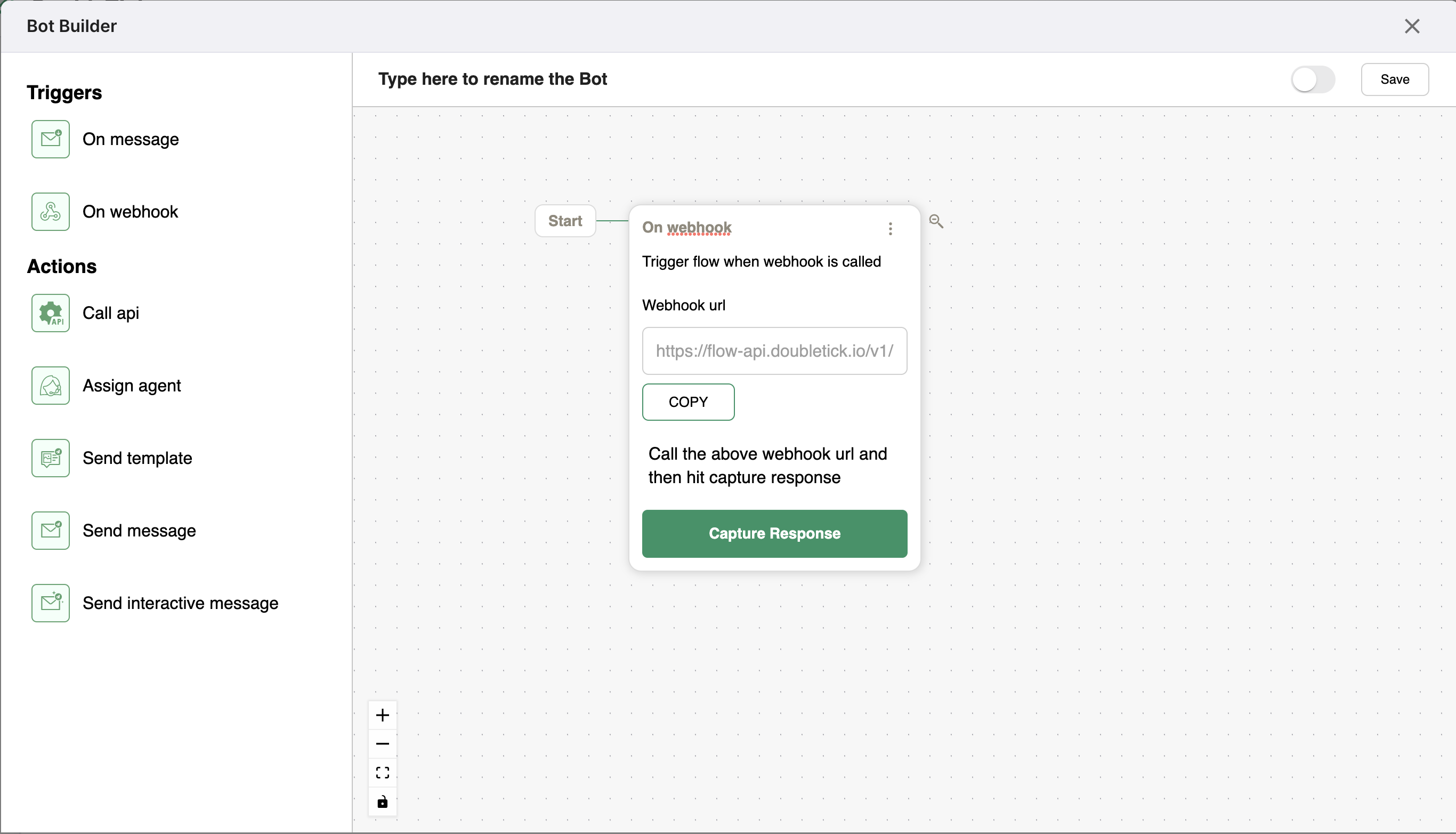
Actions:
Call API button: This button is used to call an API you've defined to trigger specific responses based on user actions.
For instance, when a customer requests product tracking or delivery updates, this API will be triggered to send the necessary information.
This is how the "Call api button" looks like:
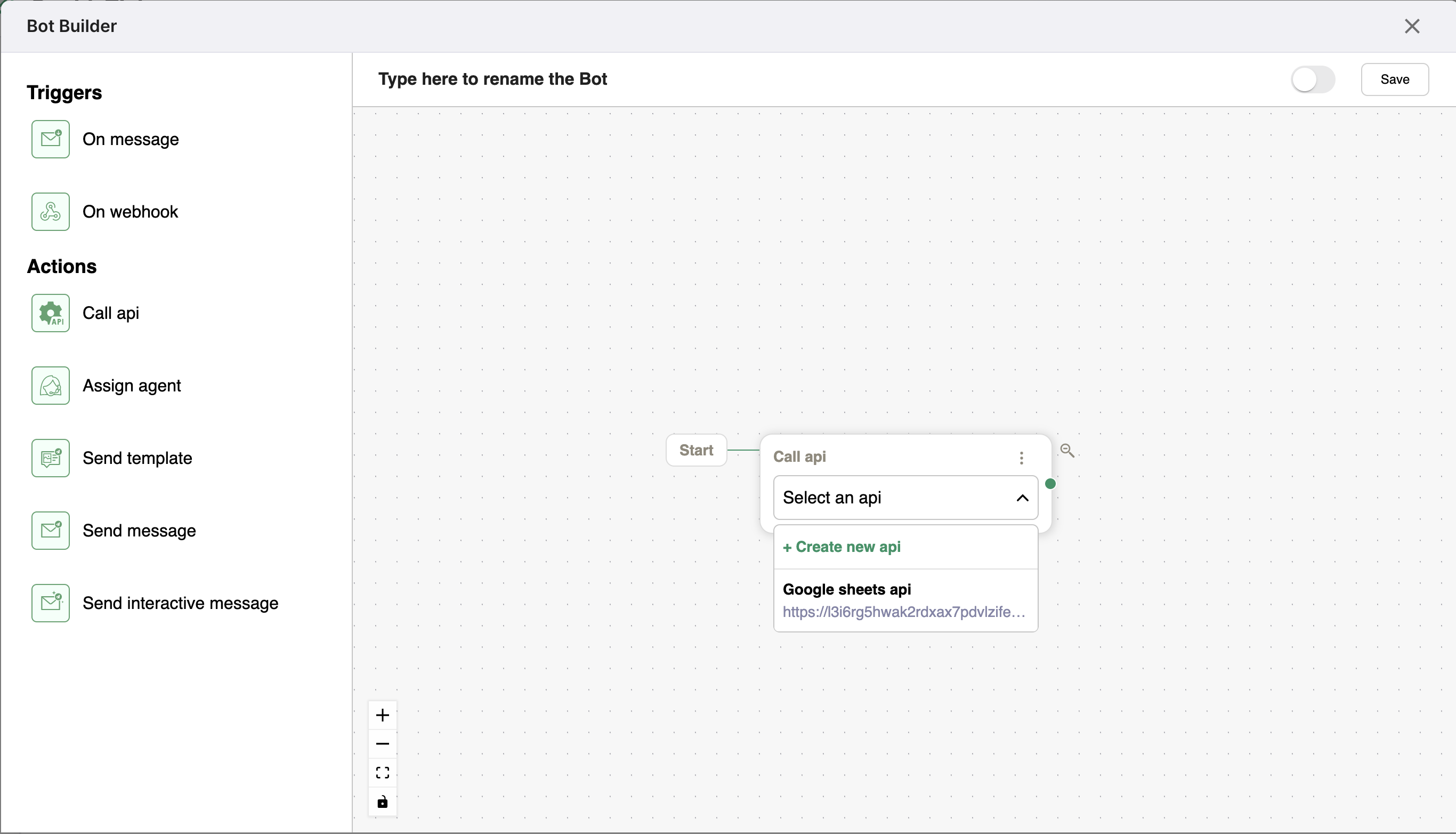
You can either "Select an API" from a pre-existing list or "Create new API." Test and deploy the API directly on the DoubleTick platform.
Assign Agent button: Use this button to dynamically assign support agents when users request human assistance. In cases requiring human intervention, this button automatically assigns an agent from your available team list, and the agent receives a notification to attend to the customer's inquiry.
This is how the "Assign agent button" looks like:
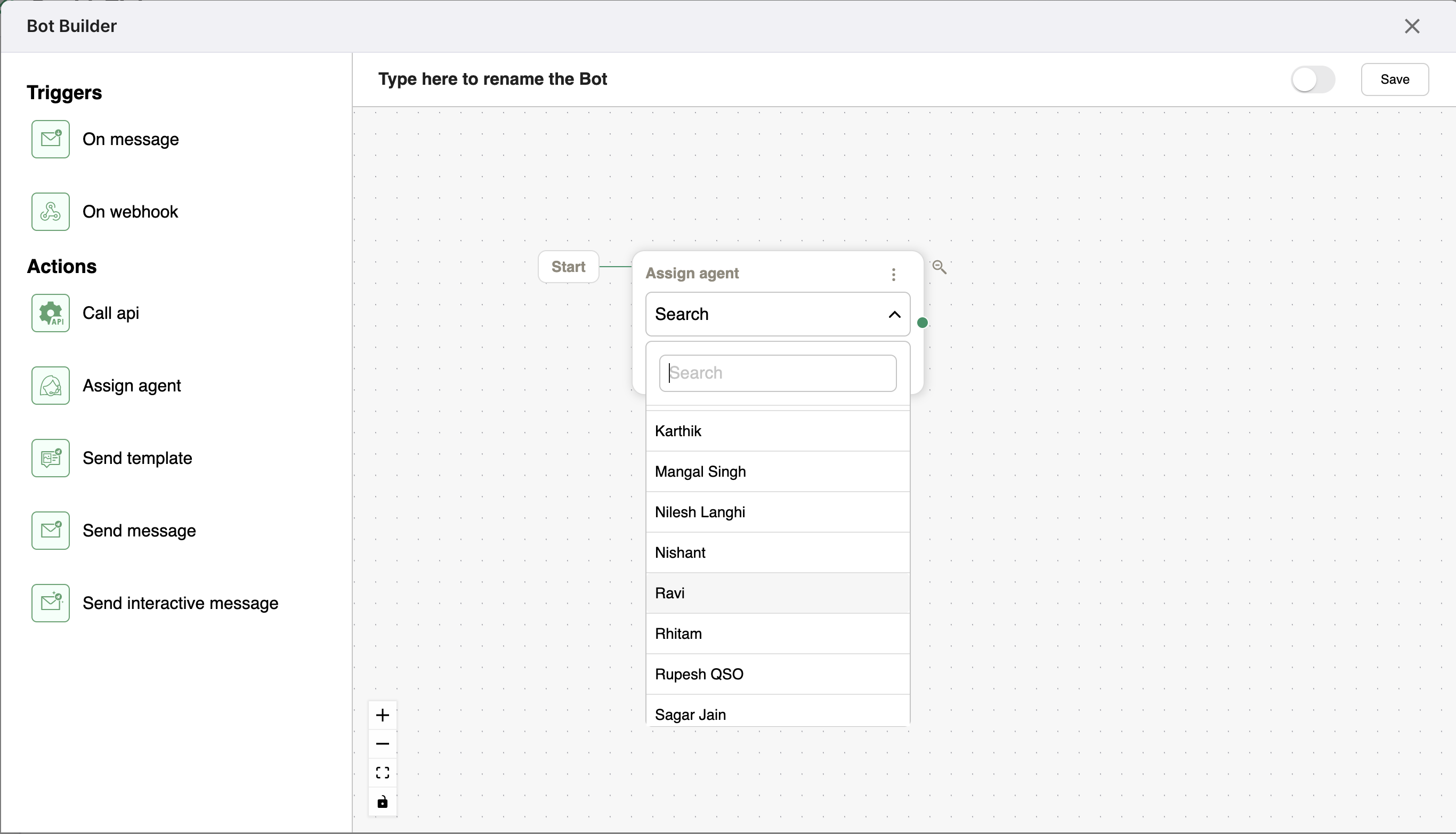
Send Template button: The Send Template button is used to call pre-approved WhatsApp template messages from your list. Instead of drafting a message from scratch using the "Send Message" or "Send Interactive Message" buttons, simply use the "Send Template" button to select and trigger the desired message.
This is how the "Send template button" looks like:
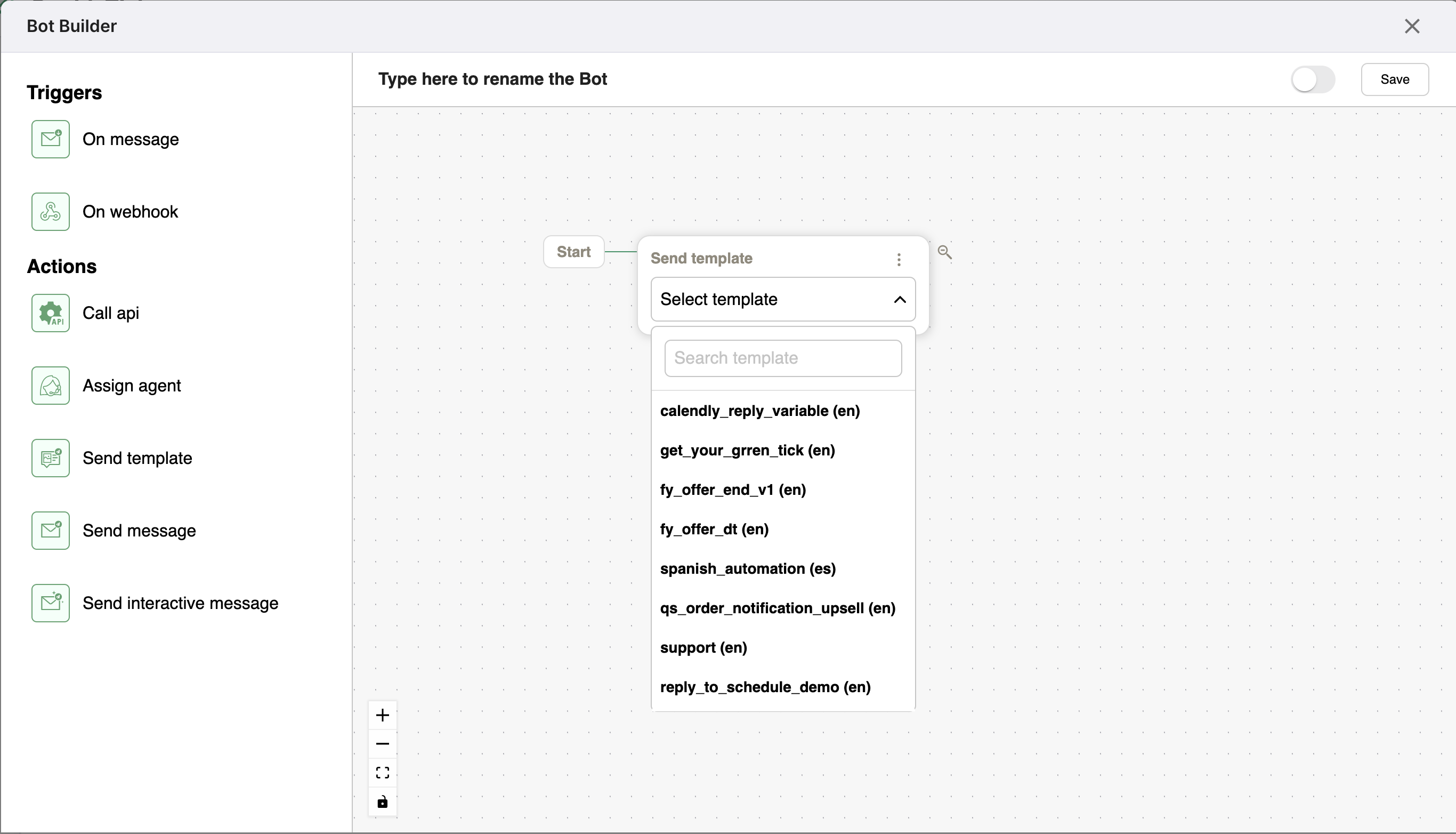
Send Message button: This button is employed to trigger communication without interactive CTAs. You can also upload media along with your text message using this button.
This is how the "Send message button" looks like:
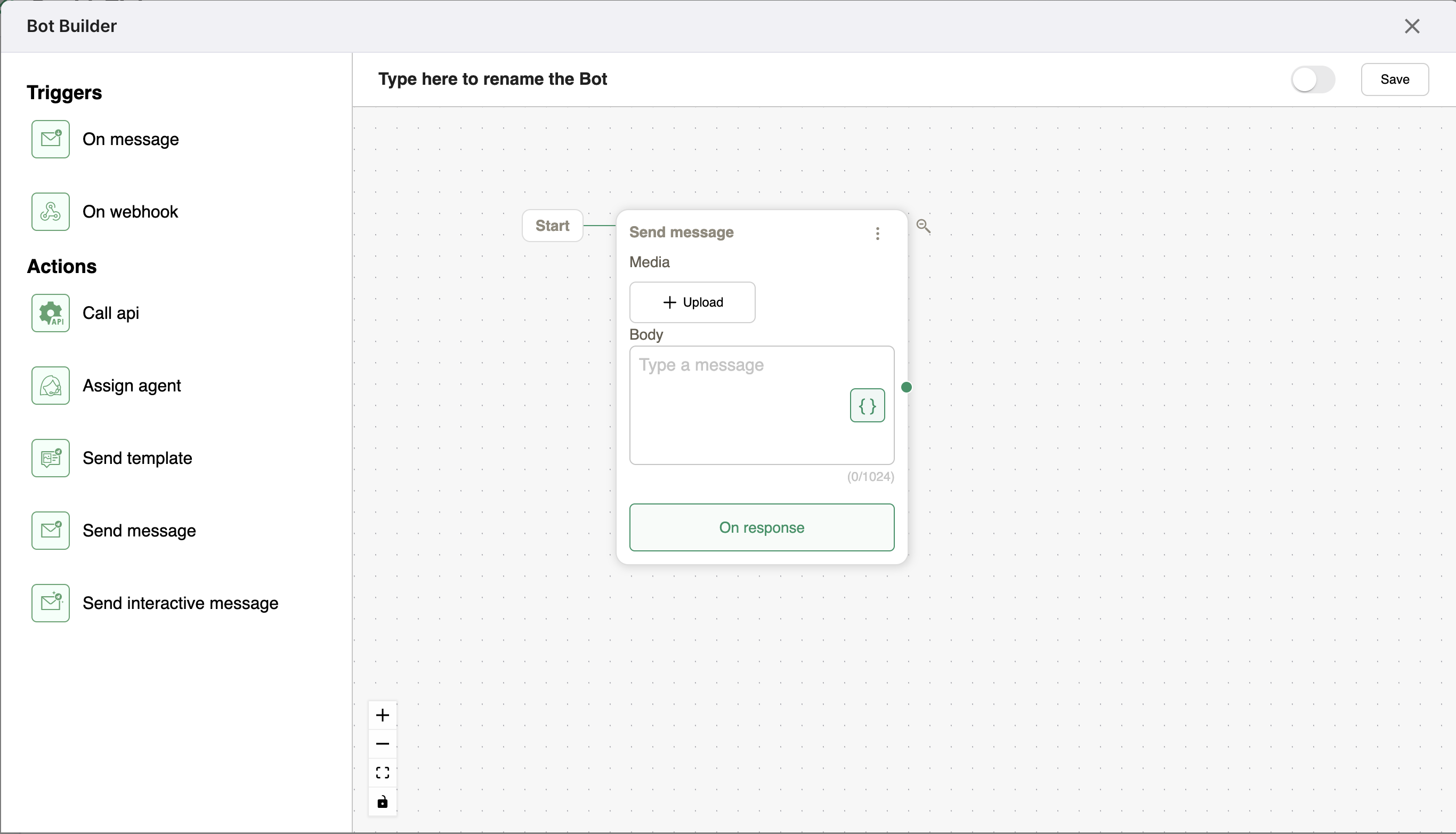
Send Interactive Message button: Use this button to trigger communication with custom interactive CTA buttons. Add a "Header," "Body," "Footer," and "Quick Reply buttons" to this option. Additionally, define a path or flow for each quick reply button that users will click to advance their communication journey.
This is how the "Send interactive message button" looks like:
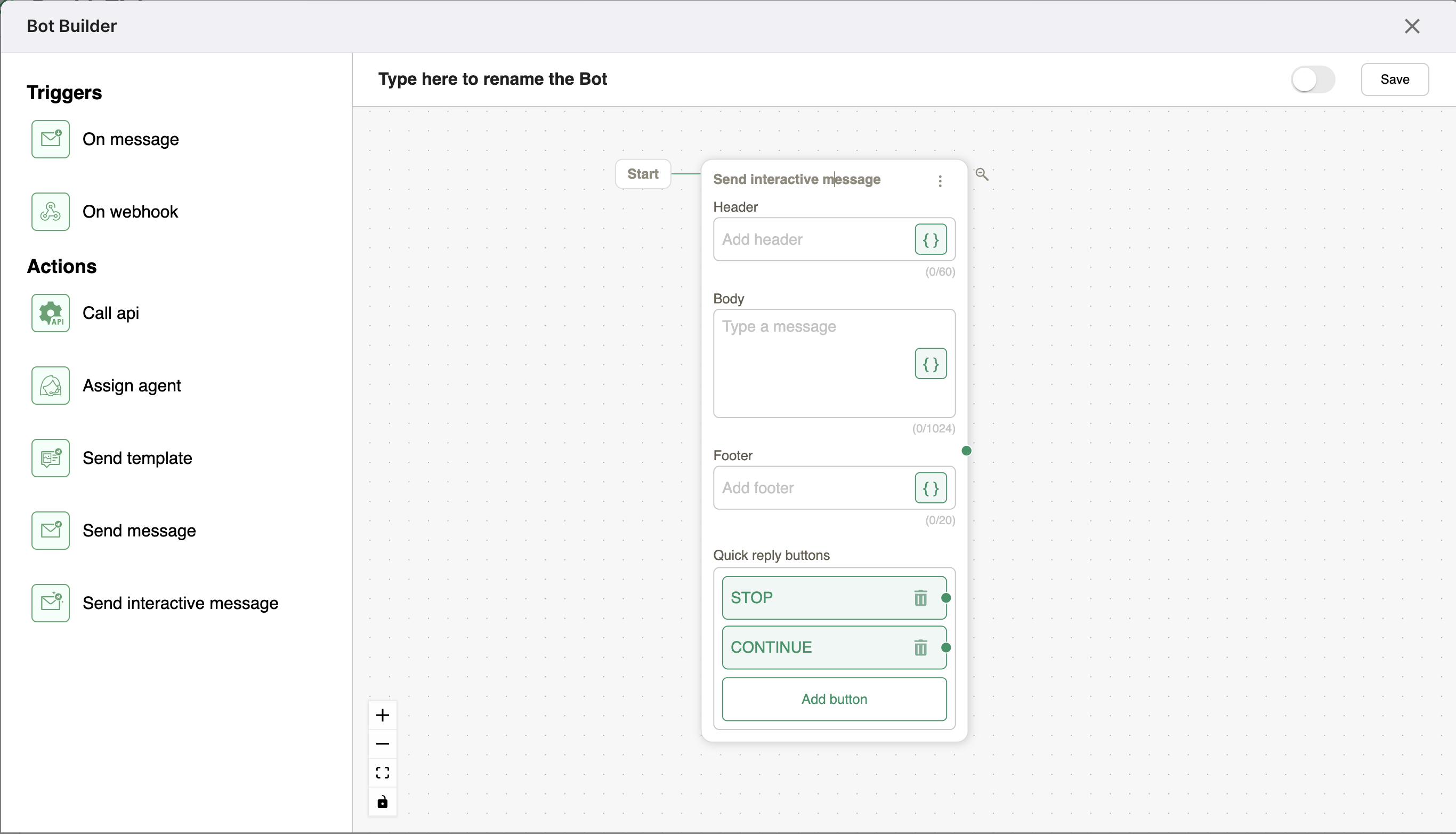
You now have a solid understanding of the different buttons and their respective use cases on the DoubleTick platform. It's time to create a chatbot for your business using DoubleTick.
To make the process even more seamless, we've prepared a video tutorial that demonstrates how to build a no-code custom WhatsApp chatbot with DoubleTick.
Refer to the video tutorial to see how these buttons can be utilized to create a chatbot with various triggers tailored to your business needs.
The potential to scale with DoubleTick's chatbot is boundless. Sign up for DoubleTick to test it out and experience the magic of chatbots for yourself.
Note:
- Be cautious while applying command variables, as duplicity can cause issues in the bot's response.
- With DoubleTick, you can create an unlimited number of chatbot flows on the dashboard.
- Seamlessly integrate third-party CRM or commerce tools with DoubleTick to fetch data and call out triggers to respond to customers based on their requests.
- Utilize APIs at any stage and wherever needed throughout the chatbot flow.
- DoubleTick's chatbot solutions can be tailored and used across various industries, including healthcare, entertainment, logistics, retail, and more.
The Future of Chatbots on WhatsApp
As technology continues to evolve, chatbots on WhatsApp are poised for even greater growth and impact. Here are some emerging trends and advancements that will shape the future of chatbots on WhatsApp:
Advancements in AI and Machine Learning: As AI and machine learning technologies improve, chatbots will become more intelligent and capable of handling complex tasks. This will result in even more efficient customer service, greater accuracy in understanding user intent, and better decision-making capabilities. Some key trends and advancements in AI technology include:
- Deep learning: The use of deep learning algorithms enables chatbots to process vast amounts of data, allowing them to better understand context, language nuances, and user intent.
- Transfer learning: This technique allows chatbots to leverage pre-trained models and apply the acquired knowledge to new tasks, reducing the time and resources required for training.
- Reinforcement learning: Chatbots equipped with reinforcement learning can learn from user interactions and optimize their responses over time, resulting in more effective communication and problem-solving capabilities.
- Sentiment analysis: AI advancements in sentiment analysis enable chatbots to understand and interpret emotions expressed by users, allowing for more empathetic and human-like interactions.
Enhanced Personalization and User Experience: With advancements in AI and machine learning, chatbots will become more adept at understanding user preferences and providing highly personalized experiences. This will not only improve user satisfaction but also help businesses tailor their offerings to better suit customer needs.
Expanding Industries and Applications: The use of chatbots on WhatsApp will expand into new industries, as more businesses recognize their potential for streamlining operations and enhancing customer experiences.
Improved Conversational Capabilities: As natural language processing (NLP) technology evolves, chatbots will be able to engage in more human-like conversations with users. This will enable chatbots to better understand context, emotions, and subtle nuances in language, leading to more effective communication.
Voice and Video Integration: In the future, chatbots may be equipped with voice and video capabilities, allowing users to interact with them through voice commands or video calls. This will add another layer of convenience and accessibility to chatbot interactions.
Omnichannel Integration: Chatbots will become an essential component of omnichannel marketing strategies, seamlessly integrating with other communication channels such as email, SMS, and social media. This will enable businesses to deliver a consistent experience across all touchpoints.
Improved integration with other business tools: As chatbots become more sophisticated, their integration with other business platforms, like ERP, CRM, and marketing automation software, will become seamless, further enhancing their value and utility for businesses.
Predictive Analytics and Proactive Engagement: With advancements in data analytics, chatbots will be able to predict customer needs and proactively engage them with relevant information, offers, or assistance. This proactive approach will help businesses anticipate customer requirements and foster stronger relationships.
These trends and advancements paint an exciting future for chatbots on WhatsApp. By staying ahead of these developments, businesses can harness the power of chatbots to drive more efficient customer service, achieve greater accuracy in understanding user intent, and enable better decision-making capabilities through their chatbots on WhatsApp.
Wrapping Up!
Businesses are racing to leverage WhatsApp as a platform for engaging and acquiring customers, and your competitors are already using WhatsApp Business solutions. So, why not take it a step further? By implementing a powerful and efficient WhatsApp Chatbot, you can truly stand out from the crowd. Your business will appear more efficient, friendly, and interactive on WhatsApp, ultimately enhancing your brand value.
Remember that user experience is crucial when it comes to WhatsApp Chatbots. By employing the right conversation design, you can create a seamless and satisfying experience for your customers. DoubleTick is here to help you every step of the way, offering all the necessary features to build a perfect no-code chatbot that keeps you ahead of the competition. So, what are you waiting for? It's time to seize this opportunity and make the most of what DoubleTick has to offer.
Frequently Asked Question
Question: What is a WhatsApp Chatbot, and how can it help my business?
Answer: A WhatsApp Chatbot is an AI-powered virtual assistant that can interact with your customers through WhatsApp. It can help your business by providing prompt customer support, streamlining various processes, improving efficiency, and enhancing customer engagement.
Question: How do I integrate a chatbot with my WhatsApp Business account?
Answer: To integrate a chatbot with your WhatsApp Business account, you need to use an official WhatsApp Business API platform, like DoubleTick. We'll help you set up the WhatsApp API and develop a custom no-code chatbot tailored to your business needs.
Question: Can a WhatsApp Chatbot understand multiple languages?
Answer: Yes, many WhatsApp Chatbots support multiple languages, thanks to natural language processing (NLP) capabilities. This feature allows businesses to cater to a diverse customer base, providing support and information in the languages they prefer.
Question: How do I ensure my WhatsApp Chatbot provides a good user experience?
Answer: To ensure a good user experience, you should focus on defining clear objectives, designing a user-friendly conversational flow, and continuously testing and iterating your chatbot. Monitoring and analyzing its performance will help you make necessary improvements.
Question: Which industries can benefit from using WhatsApp Chatbots?
Answer: A wide range of industries can benefit from using WhatsApp Chatbots, including e-commerce, healthcare, travel and tourism, banking and finance, education, entertainment, wellness, and fitness.
Question: Are WhatsApp Chatbots secure and compliant with privacy regulations?
Answer: Yes, WhatsApp Chatbots that use the official WhatsApp Business API are secure and compliant with privacy regulations. WhatsApp offers end-to-end encryption, ensuring the security and privacy of all communications.
Question: What is the role of AI and machine learning in the future of WhatsApp Chatbots?
Answer: AI and machine learning play a significant role in the future of WhatsApp Chatbots, as advancements in these technologies will lead to more intelligent and capable chatbots. This will result in improved customer service, a better understanding of user intent, and enhanced decision-making capabilities for chatbots on WhatsApp
Question: How to create a WhatsApp Chatbot?
Answer: To create a WhatsApp Chatbot, follow these steps:
- Choose a WhatsApp Business API provider like DoubleTick.
- Define your chatbot's objectives and target audience.
- Design a user-friendly conversational flow.
- Collaborate with your WhatsApp API provider to develop the chatbot.
- Test and iterate the chatbot to ensure a seamless user experience.
- Monitor and analyze performance for continuous improvement.
Question: How to make a WhatsApp Chatbot?
Answer: Making a WhatsApp Chatbot involves similar steps as creating one. You'll need to choose a reliable API WhatsApp provider, define your objectives, design the conversational flow, develop the chatbot with your provider, test and iterate for improvements, and continuously monitor and analyze its performance.
Question: How to create a WhatsApp Chatbot for free?
Answer: Creating a WhatsApp Chatbot for free might be challenging, as most WhatsApp API providers and chatbot development platforms charge for their services. You may also explore open-source chatbot platforms and DIY solutions, but keep in mind that these options may require programming knowledge and additional time investment.
Question: Are WhatsApp Chatbots free?
Answer: While some chatbot development platforms offer free plans with limited features, most WhatsApp Chatbots require an investment in development, API access, and ongoing maintenance. Partnering with a provider like DoubleTick can help you access the WhatsApp Business API and offer cost-effective chatbot development and support.
Question: How does a WhatsApp Chatbot work?
Answer: A WhatsApp Chatbot works by using artificial intelligence (AI) and natural language processing (NLP) to understand and respond to user messages on WhatsApp. It interacts with users through predefined conversational flows and can perform various tasks, such as providing customer support, answering questions, and processing orders.
Question: How can I get a green tick next to my business name on WhatsApp?
Answer: To get a green tick next to your business name on WhatsApp, your business must be verified by WhatsApp. The green tick signifies that your business account has been confirmed as an authentic brand by WhatsApp. To request verification, you must first set up a WhatsApp Business API Account, complete your business information, and ensure you comply with WhatsApp's commerce policy. After that, you can contact WhatsApp support or connect with a verified API provider like DoubleTick to request account verification. However, keep in mind that the verification process is selective, and not all businesses will receive the green tick.
Question: What is API?
Answer: API stands for Application Programming Interface. It is a set of rules, protocols, and tools that allows different software applications to communicate with each other. APIs define the way software components should interact, enabling developers to integrate various services, data, and functionalities into their applications. By using APIs, developers can save time and effort by leveraging pre-built features and services, rather than building everything from scratch.




